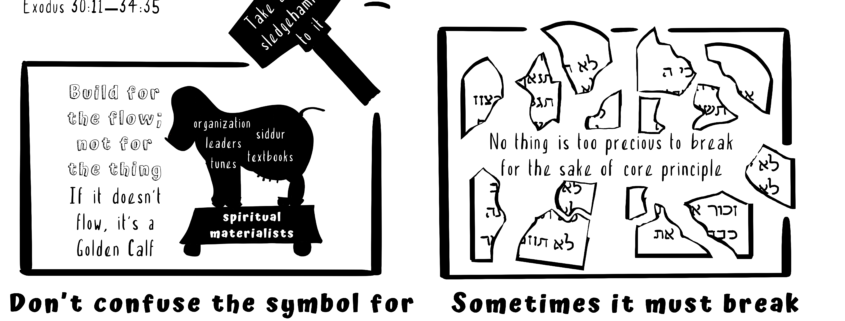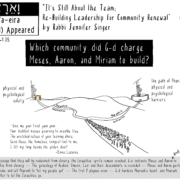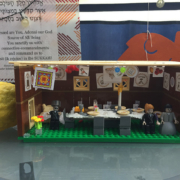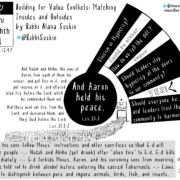The Builder’s Holy Sledgehammer: Sometimes It Must Break

Part of a yearlong series on Torah’s wisdom about building and builders in Jewish spiritual life.
Spiritual builders sometimes so deeply invest in their call to build that they can forget what that call is really about. This week’s paresha (Ki Tisa) redirects us with two related teachings: (1) nothing is too important to break, even purposefully; and (2) spiritual builders mustn’t confuse building with purpose, lest spiritual life itself become an idol.
After chapters of instruction to build the Mishkan, the story gets interrupted by the Golden Calf. With Moses on Mt. Sinai for 40 days, the people get nervous that he’ll never return. They build a Golden Calf, point to it and celebrate: “This is your god, Israel, who brought you out of the land of Egypt!” Moses sees the Golden Calf and shatters the two stone tablets on it (Exodus 32:19).
Sometimes It Must Break
Surprisingly, G!d isn’t upset that Moses shatters the tablets. Talmud records G!d to say, in essence, “More power to you!” (Yevamot 6a). We learn a key lesson: sometimes things must break. Sometimes behaviors, structures and things must break so new ones can arise.

We might imagine that some things are too important to break. If Jewish tradition would hold anything to be too important to break (“too big to fail”), then surely it’d be the tablets of the Ten Commandments. But those tablets are exactly what Moses breaks, and G!d applauds.
Why? Precisely to teach that nothing, not even G!d’s tablets, or whatever we imagine to be holy, is too precious to break for the sake of core principle. Some principles are paramount above all, even what we believe comes from G!d’s own Self.
Breaking is the way of the world. In Isaac Luria’s kabbalistic description of creation, breaking is how G!d created the universe. G!d created vessels to hold infinite light, but they shattered, unable to hold Infinity. G!d began creation anew, from shards of that cosmic shattering. In this creation story, the world is sparks of light concealed by shards of the primordial breaking.
Everything we know is a product of breaking. Physically, we’re all stardust, recycled remnants of faraway stars that exploded, fusing the elements we know on Earth. Spiritually, we’re all pieces of the Infinite, and shattered shards surround us waiting for us to lift them to light.
“As above, so below”: as in the cosmos, so too for us. Sometimes our buildings (physical and spiritual) fall. Structures suitable for one era don’t serve another. Old institutions can’t evolve with hearts and souls. The past crumbles into raw material to build the future.
Lest We Miss the Point

Meir Simcha HaKohen of Dvinsk (1843-1926), in Meshech Chochma, offers this teaching about breaking the tablets:
“‘Moses became angry and cast the tablets from his hands’ – meaning that there is no sanctity or divinity without the existence of the Creator. And if [Moses] had brought the tablets, it would be as if they were exchanging the calf for the tablets…. Moses acted superbly in breaking the tablets… to teach that nothing has inherent sanctity….”
Moses knew that if he gave the tablets while Israel danced around the Golden Calf, they’d merely trade the Calf’s emptiness for an equally empty sense of the tablets. Moses saw his people making a classic spiritual mistake: confusing a symbol for what it symbolizes.
Buddhism offers a saying: “Painted cakes don’t satisfy hunger.” Linguist Ferdinand de Saussure called this “mistaking the sign for the signified.” This is the Golden Calf’s second building lesson: don’t confuse a symbol for the reality it symbolizes. Don’t mistake any human building (or organization, siddur, tunes, leaders – anything or anyone you can touch) for the potential holiness it can represent, transmit, teach or empower.
As Rabbi Zalman Schachter-Shalomi taught borrowing a Sufi saying: “Don’t confuse the pointer for the point.”
Rabbi David Wolfe-Blank told this story to illustrate the message:
“I didn’t want to sit in the temple because they have a Buddha they all bow to, and I thought it was pretty primitive. I told the roshi that and he said, ‘Come with me,’ and we went into the Zendo.
“He said, ‘Do you think we really bow to this thing?’
“‘Well,’ I told him, ‘It looks bad. How do I know you don’t?’ He took it by the head, turned it upside down, and opened the storage room, and flung it, very disrespectfully, bounced it into the wood storage room and slammed the door. He said, ‘If we were going to bow to it, do you think I would do that?’
“People came in and saw there was no Buddha and they bowed to emptiness. So I had no trouble after that, sitting in the Zendo where the Zen teacher could do that.”
Wolfe-Blank warned us against becoming “spiritual materialists” who pile up golden moments of spiritual experience as if we can hold them tight, sought for their own sake. Like light streaming through a window, any spiritual structure is only as valuable as the spirit – wisdom, learning, kindness, love, truth and strength – that flows through.
Don’t mistake any spiritual building for the spirituality that flows through. And if real spirituality doesn’t flow through, odds are good that it became a Golden Calf no matter what anyone may have intended. That’s when it’s time to break.
As we build the Jewish future, we must build for the flow, not the thing. Just as houses are for shelter, warmth and gathering (not roofs and walls), we must design, build, repair and even break to serve the spiritual experience within. That’s the point: everything else is just the pointer.
Even the tablets had to be shattered. Even the stars had to explode so we could form from their stardust. So don’t be afraid to break things for the sake of spirit. Sometimes what spiritual builders of the future need most is a holy sledgehammer today.


By Rabbi Ben Newman. Sketchnote by Steve Silbert.










Trackbacks & Pingbacks
[…] builder Ben Newman reminds us that God applauded Moses for shattering the tablets at the Golden Calf, teaching that no […]
Comments are closed.